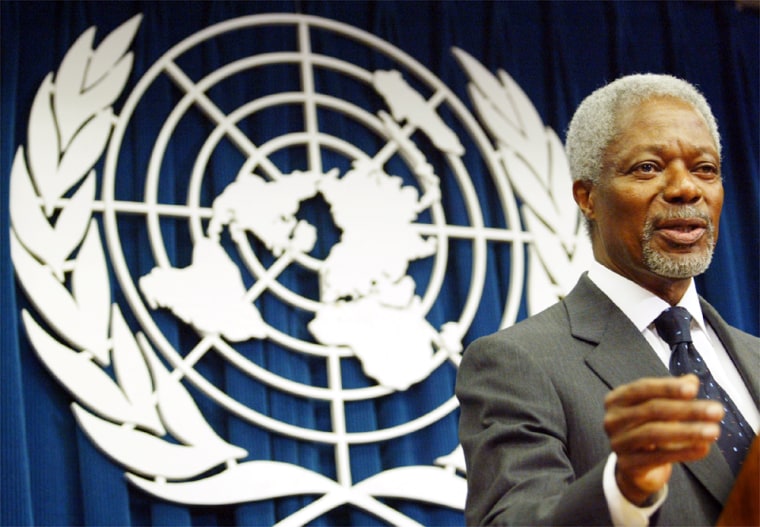Secretary-General Kofi Annan on Thursday called for a Jan. 15 meeting of the key players in Iraq to pin down what role they want the United Nations to play as the country moves from U.S. occupation to a democratically elected government.
Annan, clearly frustrated that Iraqi Governing Council or the U.S.-led coalition running the country have not given him specific answers, said it was time to sit down with representatives from both bodies.
'Three-way conversation'
“It has to be a three-way conversation,” the secretary-general said. “Once we have that, I will make a judgment.”
U.N. officials indicated that the secretary-general’s primary aim is getting specific answers from the Americans on what they want the United Nations to do before the coalition hands over power to a provisional Iraqi government in June.
Speaking at news conference, Annan said he was certain the Governing Council would attend the meeting at U.N. headquarters, but preliminary consultations had just begun with the coalition.
Asked about “suspicions” that L. Paul Bremer, the top U.S. administrator in Iraq, and the Governing Council don’t want a meaningful role for the United Nations, Annan noted that the United Nations was never mentioned in the November agreement between the coalition and the Iraqis setting out the timetable to general elections by the end of 2005.
“There have been some questions about whether this was an omission or was it a message,” Annan said. “This is something we will have to clarify when we sit down.”
Russia, France and Germany — leading opponents of the U.S.-led war against Iraq — have pushed for the United Nations to take the leading political role in Iraq.
Another issue certain to be on the Jan. 15 agenda is the return of the U.N.’s international staff.
Annan pulled all U.N. international staff out of Iraq in October following two bombings at its headquarters and an upsurge in attacks against humanitarian targets. He still considers the security situation too dangerous for their return.
The United States is pressing to get U.N. staff back in Iraq quickly, but U.N. officials indicate that Annan will likely stick to his current plan for the United Nations to operate out of Cyprus and Jordan.
Annan and senior U.N. officials have argued that the United Nations can do a lot from outside Iraq, with possible trips into the country. But Iraq’s Foreign Minister Hoshyar Zebari said Tuesday U.N. staff need to be on the ground to play an effective role in the complex political process.
The secretary-general reiterated Tuesday that he will weigh the risk to staff against the job they would be asked to do in determining whether to take on the role the council and the coalition propose.
U.S. Ambassador John Negroponte said he wasn’t aware of an invitation to the coalition but reiterated that Washington wants the United Nations to play “a vital role” in Iraq.
“I think what the secretary-general is driving at here is the need — whether it’s in New York on Jan. 15 or however it takes place — to reach some kind of agreement between the council and the coalition and the United Nations on exactly and under what circumstances the U.N. could go back in to Iraq,” he said.
“I would emphasize that we would welcome the return of the United Nations and their international personnel to Iraq as soon as absolutely possible,” he said.
'Mend fences'
Annan said that while the past year saw major divisions over Iraq, “I think attempts are really being made to mend fences.” He cited an increase in trans-Atlantic contacts, which he predicted “will lead to a thaw ... and I think next year we’ll see much better relations.”
The year-end news conference was dominated by Iraq but Annan stressed that “the world is much bigger than Iraq.” He expressed hope that next year world leaders will focus on the challenges posed by AIDS, poverty, disease and illiteracy while continuing to fight terrorism and halt the spread of weapons of mass destruction.
He also strongly supported “the serious alarm” sounded by the top U.N. envoy in Afghanistan, Lakhdar Brahimi, about the deteriorating security situation in the country.
“If we do not deal with that, we may lose Afghanistan,” Annan said.
